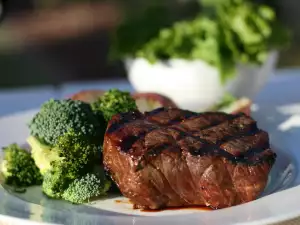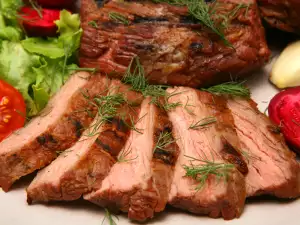Representing about 20% of the weight of the human body, proteins perform a variety of functions in the body as essential components of body tissues, enzymes and immune cells.
Proteins are complex molecules that consist of a combination of amino acids - compounds that contain carbon, oxygen, hydrogen, nitrogen and sometimes sulfur. Amino acids interact with each other in specific combinations and unique number for each different protein.
Proteins, providing 4 calories per gram, are an important source of energy for your body when carbohydrates and fat are not available. In addition to using proteins to generate energy for cell functions, bodies use amino acids contained in proteins to produce their own proteins where appropriate.
Protein Functions
Proteins produced by the body perform many important physiological functions, such as:

- Production and maintenance of structural proteins the body produces several structural proteins such as myosin, actone, collagen, elastin and keratin, which maintain the strength and integrity of muscles and connective tissue (ligaments and tendons), hair, skin and nails.
- Production of enzymes and hormones : all enzymes, which are compounds that catalyze chemical reactions in the body are composed of proteins. In addition, the hormones involved in the regulation of our blood sugar (insulin and glucagon), and thyroid hormones are also synthesized from proteins.
- Production of transporting proteins and lipoproteins: some proteins used by the body to transport various substances to the body tissues. These include prenyasyashti protein hemoglobin (carries oxygen), transferrin (has iron ), ceruloplasmin (has honey ), retinol-binding protein (is Vitamin A), albumin and transtiretin (wear other proteins). Lipoproteins involved in the transport of fats and cholesterol.
- Production of antibodies: antibodies that are actually proteins play an important role in the immune system by connecting with antigens (viruses, bacteria), thereby inactivating antigens and making them more visible to the immune cells (called macrophages) that destroy antigens.
- Maintain proper water balance: proteins are involved in the maintenance of osmotic pressure, which controls the amount of water inside the cells.
- Maintain proper acidic balance: due to their ability to combine with acidic and basic substances, proteins help to maintain the acid balance in your body.
Protein Deficiency

Both adults and children can live healthy and have a low protein intake, if getting enough calories, because of all the essential amino acids present in food. As a result, the symptoms of protein deficiency are most commonly seen in the poor people, who have limited access to food.
Protein-energy malnutrition, caused by a low dose of protein and calories, is especially common in children in developing nations, as they require more protein per pound of body weight than adults, in order to promote rapid growth and development.
There are two types of protein-energy malnutrition: marasmus and kwashiorkor. Marasmus is a state of semi-starvation, which can occur in people of all ages who have limited access to food, but is most common in children who are not breastfed. Symptoms of marasmus include weight loss, muscle mass, fat, weakness, fatigue and frequent infections.
Kwashiorkor is a Guinean word for "evil spirit that infects the child" and usually occurs in children under 4 years of age who have a diet with lots of carbohydrates and little protein. Symptoms of kwashiorkor include loss of muscle mass, edema (fluid retention) and hepatic steatosis.
High protein intake
Excessive protein intake over many years can lead to kidney problems and/or accelerated bone loss that ultimately leads to osteoporosis.
When cooking, proteins undergo physical changes called denaturation and coagulation. Denaturation involves changes in the form of proteins, thereby reducing the solubility of the protein molecule.
Coagulation causes clotting in protein molecules, as happens when cooking scrambled eggs. When foods containing proteins are cooked more than necessary, it is possible to destroy the heat sensitive amino acids (eg, lysine) or the proteins might become resistant to digestive enzymes.
Any drug that reduces the secretion or neutralizes the action of hydrochloric acid in the stomach has a negative impact on the digestion of protein. In addition, steroid anti-inflammatory drugs (such as prednisone) may lead to loss of muscle mass, so it is recommended that people who take these drugs do increase their protein intake.
Though necessary for our health, protein is not often used therapeutically. However, a high protein diet is good for people who have severe physical trauma and athletes. In addition, several individual amino acids such as glutamine, lysine, phenylalanine, tyrosine, arginine and cysteine are frequently used therapeutically.
Taking supplements are available a wide range of protein powder. Especially popular are those containing soy protein as soy is known for its ability to prevent cardiovascular disease and cancer.
Sources of protein
Excellent source of protein are tuna, shrimp and cod. Good sources are venison, halibut, salmon, scallops, turkey, chicken, lamb, beef, beef liver, spinach, tofu, mustard, soy beans and mozzarella.
Other good sources of protein are eggs, milk, cauliflower and many legumes.






















